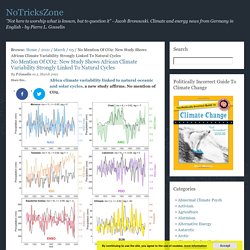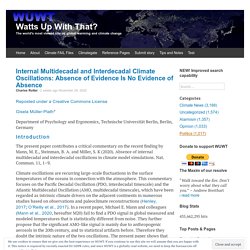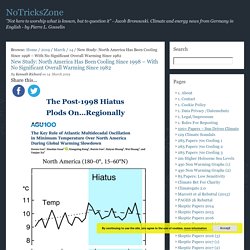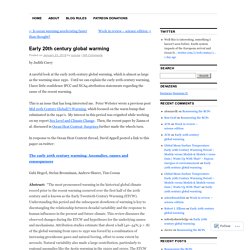

Atlantic Multidecadal Oscillation (AMO) North Atlantic Oscillation (NAO) Pacific Decadal Oscillation. New Study Finds A Robust Link Between European Temperatures And Solar Activity Via AMO/NAO Modulation. By Kenneth Richard on 22.

October 2020 European winter temperature variability is “dominated” by the North Atlantic Oscillation (NAO), which is, in turn, modulated by solar activity. Even proponents of anthropogenic global warming (AGW) agree natural processes (AMO, NAO, ENSO, solar forcing, volcanism) drive temperature variability. But they insist the rising temperature trend is human-caused. So if we don’t have a regional upward trend, is the non-warming natural or anthropogenic?
Lüdecke et al., 2020 find temperatures across Europe have been oscillating, not rising in linear fashion, for the last century. No Mention Of CO2: New Study Shows African Climate Variability Strongly Linked To Natural Cycles. Africa climate variability linked to natural oceanic and solar cycles, a new study affirms.

No mention of CO2. Image source: “Decadal and multidecadal natural variability of African rainfall“. A new study analyzes patterns of natural rainfall variability and can provide crucial assistance to African countries in seasonal rainfall forecasting for agriculture and protection against droughts & heavy rains. Understanding natural cycles the key to model projections Sufficient rainfall is the basic condition for high-yield agriculture and food security for the population. A group of researchers led by Horst-Joachim Lüdecke wanted to know more and meticulously searched for patterns in the monthly rainfall data of 49 African countries for the period 1901 to 2017 using statistical methods. “Large number of robust correlations” The scientists compared the rainfall fluctuations with five oceanic indices of natural origin that are firmly established in science, as well as with solar activity. Internal Multidecadal and Interdecadal Climate Oscillations: Absence of Evidence Is No Evidence of Absence.
Reposted under a Creative Commons License Gisela Müller-Plath* Department of Psychology and Ergonomics, Technische Universität Berlin, Berlin, Germany Introduction The present paper contributes a critical commentary on the recent finding by Mann, M.

E., Steinman, B. Climate oscillations are recurring large-scale fluctuations in the surface temperatures of the oceans in connection with the atmosphere. After briefly sketching the rationale and method of M20, I will elaborate on these three points. In Parts Of Japan, Mean Maximum Temperatures May Be More Impacted By Remote Ocean Cycles Than By CO2. By P Gosselin on 26.

September 2020 By Kirye and Pierre Gosselin Today, according to government scientists, CO2 is supposed to be the dominant climate driver, overwhelming all the other power natural forces such as solar variability and oceanic cycles. Policymakers Misled…New Nature Study “Casts Doubt On Forecasts Of Regional Climate Change” New Study: North America Has Been Cooling Since 1998 – With No Significant Overall Warming Since 1982. By Kenneth Richard on 14.

March 2019 Image Source: Gan et al., 2019 North America (180-0°N, 15-60°N) has been characterized as a “major cooling center” by the authors of a new paper (Gan et al., 2019) published in Earth and Space Science. The continent warmed from 1982-1998, but a cooling trend since 1998 has nearly wiped out all the previous warming. Overall, there has been no significant temperature change in North America since 1982. The warming and cooling trends, especially the daily temperature minimum (Tmin), are well-correlated (r=0.71) with the path of the Atlantic Multidecadal Oscillation (AMO) during 1950-2014, leading the authors to conclude that the temperature trends over this 32-year period are “a result of” natural changes in the AMO. Climate Fish Tales. What’s Natural?

Guest essay by Jim Steele American folk lore is filled with stories of how Native Americans observed changes in wildlife and foretold future weather changes. I was fascinated by an 1800s story of Native Americans inhabiting regions around Marysville, California who had moved down into the river valleys during drought years. They then moved to higher ground before devastating floods occurred. Did they understand California’s natural climate cycles? Observing salmon has certainly improved modern climate science. Scientists soon realized the observed alternating patterns in fish abundance not only coincided with those puzzling changes in ocean surface temperatures, but also with regional drought-flood cycles, glacier growth and retreat, and tree-line advances and retreats.
The newly characterized PDO had yet to be included in climate models. Similar fish tales have been reported globally. And there is a truly optimistic fish tale. Contact: naturalclimatechange@earthlink.net. Early 20th century global warming. By Judith Curry A careful look at the early 20th century global warming, which is almost as large as the warming since 1950.

Until we can explain the early 20th century warming, I have little confidence IPCC and NCA4 attribution statements regarding the cause of the recent warming. This is an issue that has long interested me. Peter Webster wrote a previous post Mid 20th Century Global(?) Warming, which focused on the warm bump that culminated in the 1940’s. In response to the Ocean Heat Content thread, David Appell posted a link to this paper on twitter: The early 20th century warming: Anomalies, causes and consequences Gabi Hegerl, Stefan Bronniman, Andrew Shurer, Tim Cowan Abstract: “The most pronounced warming in the historical global climate record prior to the recent warming occurred over the first half of the 20th century and is known as the Early Twentieth Century Warming (ETCW).
This paper ‘shocked’ me for several reasons. Concluding statement: The data Let’s look at the data. Earth Science Reviews FG 2016.